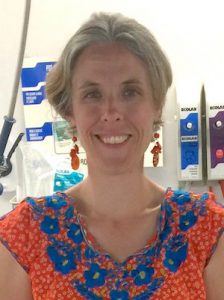 Please join me in saying hello to Dr. Jeanette Andrade, assistant professor and Program Director of FSHN’s Master of Science/Dietetic Internship (MS/DI) Program! Dr. Andrade is in her second year at the University of Florida, and she is a registered dietitian nutritionist and an expert in counseling and nutrition education. Read on to learn about her path to nutrition education, her innovative work with dialysis patients, her views on the most pressing nutrition-related issues the public is facing, and what’s in her refrigerator right now!
Please join me in saying hello to Dr. Jeanette Andrade, assistant professor and Program Director of FSHN’s Master of Science/Dietetic Internship (MS/DI) Program! Dr. Andrade is in her second year at the University of Florida, and she is a registered dietitian nutritionist and an expert in counseling and nutrition education. Read on to learn about her path to nutrition education, her innovative work with dialysis patients, her views on the most pressing nutrition-related issues the public is facing, and what’s in her refrigerator right now!
Tell me about how you became interested in nutrition education, especially concerning developing education materials for low-income adults. What was your inspiration, and what path did you take to get there?
This takes it back a little bit, so some history. As I was finishing up my bachelor’s degree, I wanted to obtain my master’s degree in nutrition, but at that time, I did not know the area in which I wanted to do research. I started off my master’s at Purdue University working on food insecurity and then decided to pursue my master’s at another institution, so I went to Eastern Illinois University, which had a combined MS/DI program. They also, at that time, provided a certificate in nutrition education. So, I took two classes focused in that area. It was not until I started practicing as a registered dietitian nutritionist that I realized I needed to really understand how to educate someone to help them change their dietary behaviors. This of course is no easy task, so I pursued a doctorate in education. My dissertation focused on different types of multimedia and the impact it had on college students’ cognitive load based on their epistemic beliefs about learning. I was intrigued with this, so while I was at Eastern, I started to work on different techniques to teach dietetic students.
When I started at UF, I wanted to continue in this line, but also focus on health professionals and developing educational strategies to enhance their ability to provide basic nutrition information to their clients. In the same token, I wanted to focus on adults with chronic diseases and understand the impact various educational strategies and food intake has on the progression of their chronic diseases. The results thus far have been promising that health professionals and students alike are receptive to these educational strategies, but we are continuing to assess the impact on a long-term basis.
You’ve also forged a path improving students’ learning experiences. What advice would you give to students hoping to make the most of their education?
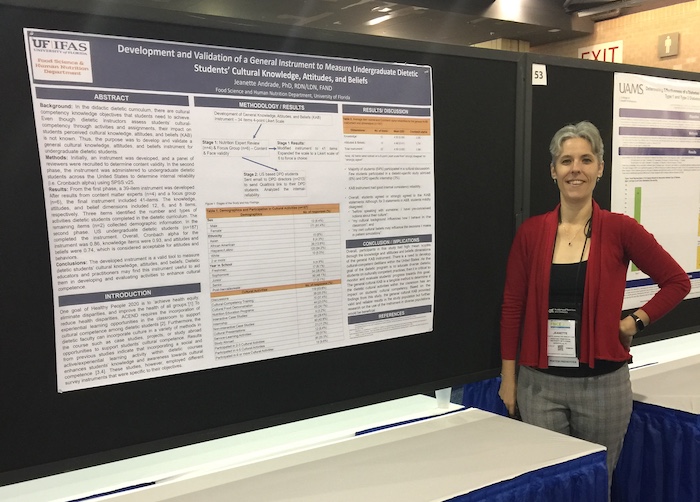
My advice to students is be flexible and open. Whether I am teaching an undergraduate or graduate level class, I guide the students in their projects, but essentially, they need to develop their own projects and ways to determine the feasibility of it. For example, in my graduate level Nutrition Education course, students need to develop a toolkit based on a need they see within the Alachua county area. I provide them with my requirements of what they need to submit – goal, learning objectives, lesson plan, etc, but they must creatively fill in the blanks. For this toolkit they work in groups. This past fall, we had great toolkits at the end: a toolkit to train volunteers and employees at the Field and Fork food pantry and another toolkit to help college students eat mindfully.
Would you share some of the most recent projects you’re working on?
I have two main projects that I am working on, plus some smaller projects. The two main ones are: (1) cultural culinary nutrition classes for college students and (2) high protein snack for adults on dialysis.
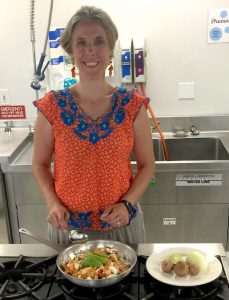
For the cultural culinary nutrition classes, the goal is to improve college students’ cooking skills, attitudes, confidence and potentially their consumption of fruits and vegetables through peer-led classes. Twice per month for four months, two undergraduate students, who have a background in the culinary arts, facilitate the cooking classes. Participants of this class work in groups to prepare three recipes, and at the end of the class they all communally eat what they prepared. Not only do students learn how to prepare dishes from around the world, but they are also taught basic cooking skills and nutrition information about the dishes. This project is only possible through the funding from UF’s Creative Arts Catalyst Award.
For the high protein snack for adults on dialysis, the goal is to understand the impact a high protein snack has on participants’ serum albumin, serum phosphorus and dietary adherence. A brief overview of this project: six times per month for six months, immediately post-dialysis, participants are provided with a 240-gram high protein snack (35 grams of protein). Each month they are asked about their dietary habits pre- and post-consumption of the snack. For three months before and three months after the intervention, we collect serum albumin, serum phosphorus and dietary adherence information. This project is only possible through the funding from the National Kidney Foundation and the collaboration with medical director and dietitians at Fresenius Kidney Care.
One smaller project I have ongoing is a mentoring program for our graduate dietetic students. In this program, the graduate dietetic students mentor undergraduate senior dietetic students as a way for the graduate dietetic students to enhance their leadership skills. They participate in eight 2-hour classes once per month over the entire year. Then, the graduate student mentors have a face-to-face meeting with their mentees once per month to discuss topics in class or other areas about which their mentees may have questions. At least once per month, mentors follow up with mentees through text or email.
Another project I have on-going is developing online training sessions for our dietetic preceptors. Over the fall, we conducted a mixed-method study to identify areas that preceptors would like more information on. Thus, our goal is to develop and pilot these trainings before implementing them within a larger dietetic population.
As a registered dietitian nutritionist, what do you feel is the most pressing nutrition-related issue that the public is facing today?
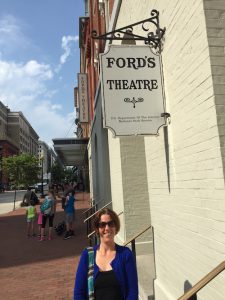
I could go on for hours with this one! My biggest one is opinion-based versus fact-based nutrition information. I see this with the marketing of plant-based diets. I do want to be clear: I have no problem with the plant-based diet–in fact, my research is within this area–but there is a difference between minimally processed plant-based foods versus processed plant-based foods. So, if someone consumes processed plant-based foods, let’s say potato chips, this individual is at a higher risk for developing certain chronic diseases than if that same individual ate a plain, medium-sized baked potato. Thus, when someone tells me they are following a plant-based diet because s/he heard it was healthy, but that diet is comprised of processed plant-based foods, I explain the research behind processed versus minimally processed plant-based foods. For some, these explanations encourage them to not believe everything they read or hear about.
What do you like to do in your spare time?
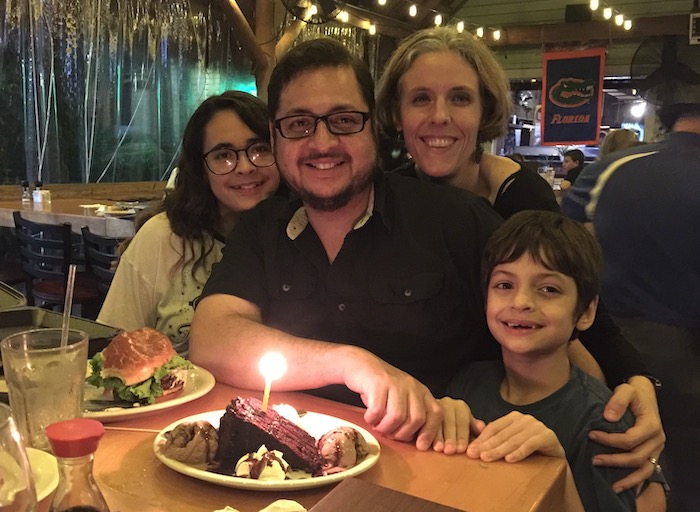
My kids are my life at home, so we are usually going bowling or to a trampoline park. We enjoy walking through the nature trails and going on road trips to find new places to explore. I am a big walker, so if you tell me there is a new trail to explore, I am the one pumping my kids up for an exciting walk!
If I opened your refrigerator right now (I promise, I won’t!) what would I find in it?
If you opened my work fridge right now, you would find coffee creamer and coffee in there–the staples of my diet. My home fridge is a whole other story, but overall a good balance of proteins, vegetables and grains, and you cannot forget about condiments!
Interested in learning more about the field of dietetics and other fascinating projects like Dr. Andrade’s? Read more here and here!
P.S. Want to read more about the amazing work going on in the FSHN department? See our previous student and faculty profiles below:
Graduate Student Profile: Savanna Curtis, Food Science
Undergraduate Student Profile: Shannon Mai, Dietetics
Faculty Profile: Dr. Naim Montazeri, Food Virology
Graduate Student Profiles: Carley Rusch and Matthew Beke, Nutritional Sciences
 0
0
